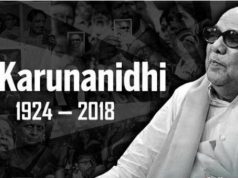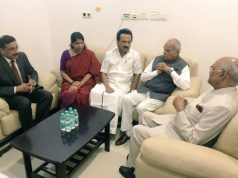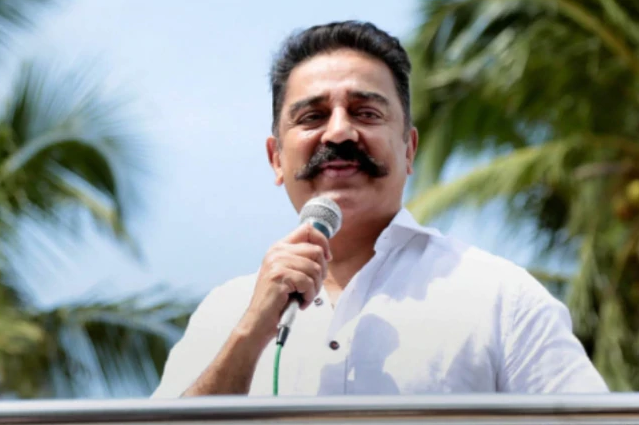 CHENNAI, JUNE 3- As a 14-year-old during the anti-Hindi agitation, he walked alongside Periyar as E V Ramasamy was called, with a spring in his step and vigour in his heart. Breaking away from a traditional family of temple musicians, he made politics his domain.
CHENNAI, JUNE 3- As a 14-year-old during the anti-Hindi agitation, he walked alongside Periyar as E V Ramasamy was called, with a spring in his step and vigour in his heart. Breaking away from a traditional family of temple musicians, he made politics his domain.
His fledgling party formed as a breakaway faction from the original DK in 1949, soon went on to shape national politics in the post-emergency era. Today, 10 years short of his centenary, Muthuvel Karunanidhi is the oldest surviving active political leader of stature in the country with lakhs of party functionaries under his command for the past 44 years. Only his party general secretary K Anbazhagan is older than him. Karunanidhi enters his 90th year on Monday.
Facing a succession war, 2G scam charges and political isolation after the recent pullout from the UPA II regime, the DMK veteran is still a fighter strategizing at party conclaves. A five-time chief minister of Tamil Nadu taking over the reins of CM at a relatively young age of 44 years succeeding C N Annadurai, and 12- time MLA, Karunanidhi has been meeting party cadres and writing for them in the party organ almost every day.
 Karunanidhi is the first Dravidian leader to set his sight on national politics, say analysts. “Till his mentor Anna’s period, the DMK had focussed on state politics. But Karunanidhi adopted a different strategy. He has been concentrating on national politics since 1971. He was planning to get more projects and funds for the state with the support of the Centre. Though, there was a strong anti-Congress mood in the party, he aligned with the Indira Gandhi-led Congress in the 1971 Lok Sabha elections,” Dravidian writer and historian ‘Sangoli’ K Thirunavukkarasu told TOI.
Karunanidhi is the first Dravidian leader to set his sight on national politics, say analysts. “Till his mentor Anna’s period, the DMK had focussed on state politics. But Karunanidhi adopted a different strategy. He has been concentrating on national politics since 1971. He was planning to get more projects and funds for the state with the support of the Centre. Though, there was a strong anti-Congress mood in the party, he aligned with the Indira Gandhi-led Congress in the 1971 Lok Sabha elections,” Dravidian writer and historian ‘Sangoli’ K Thirunavukkarasu told TOI.
The DMK was the first party to pass a strong resolution against the Emergency. The Karunanidhi-led government was dissolved in 1976 following the Emergency. “He played a vital role in the formation of the National Front in 1988. He had organised a big event for the National Front and leaders like V P Singh, N T Rama Rao and others participated. DMK became a constituent of the Union government for the first time when V P Singh formed the government in 1989. The DMK has had a strong hold at the Centre for the past 15 years with its representatives a part of the Centre,” he said.
Commentators say that Karunanidhi never gave up his basic ideologies like justice and the interest of Tamil language. “Karunanidhi has been following his ideologies from the time of the Justice Party,” Thirunavukkarasu said.
Though Karunanidhi dropped out of schools unlike his colleagues in the party, R Nedunchezhian and EVK Sampath, he managed to succeed Anna. “Others acted like leaders. But, Karunanidhi acted as a party worker. When he was a treasurer of the party during the Anna years, he had travelled across the state and consolidated his support base,” party seniors recalled.
Karunanidhi not only attracted the cadres but also impressed his mentors Anna and Periyar. “The other leaders in the party only knew about me, but Karunanidhi was the only one who knew the real me,” Anna once said. In fact, it was Periyar who proposed Karunanidhi’s name for DMK’s top post.
Political observers say that Karunanidhi’s hard work is the key factor for his consistent success. “He is still reacting to all the important issues. He has been writing letters and statements on a daily basis. Once he had said he would feel bad if he was not writing anything on any given day,” writer and politician D Ravikumar said. The Karunanidhi government had initiated many schemes and projects for the marginalised people like beggars, transgenders and the disabled.
The big challenge for the patriarch is to regain power in the state and and his ‘World Tamil Leader’ title. “Pulling out from the UPA government after enjoying nine years of power at the Centre, DMK has no allies now except the VCK. With not in power in the state, the party has been facing a serious crisis,” said a senior leader.
But, they are confident that their leader can come back to power with his commitment. “We were not in power for 13 years during the MGR period. We got only two seats in the 1991 assembly elections in the wake of Rajiv Gandhi’s assassination. But we bounced back with Kalaignar’s efforts and strategies,” said another leader.










